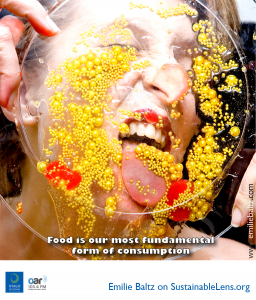Food is our most fundamental form of consumption
Emilie Baltz is a food designer and artist who has produced Junk Foodie and L.O.V.E. Handbook. She was in Dunedin to keynote at Food Design.
Talking points
Food is a personal material for me…it represents identity, community and culture
Slowness means locality, but also greater awareness
Food is an experimental and experiential material
(Traces) Cultural codes – we have tables, we use utensils…getting rid of all the distance and bringing ourselves back to a place of primitive being, in a sustainability mindset we’re reminding ourselves of the place we exist as humans, that brings us to our primitive level within a civilised state
As food becomes more sanitised, we get further and further away from actual ingredients
Eating, over consumption, we need to look as a part of a whole ecosystem
We’ve created a host of products that depend on systems and those systems and those systems have been very badly constructed.
As designers -and design is about the discipline of order – we’re having to reorder and reframe and redesign those systems for better consequences
Food is at heart one of the issues of over-consumption, so how do we begin to look at that as human behaviour and reorganise it and reframe it?
America…is one of those spaces where there is a great deal of over consumption and inequality of consumption.
The pioneer mindset of eating as much as you can is still in place. Greater conversations and awareness are the beginning.
Working in food brings the opportunity for the conversation to be playful, joyful, not just finger wagging. I don’t believe people change when we wag our fingers at each other. But we do begin to change when we’re in a positive mindset and when we move forward in a positive space and the food and the dining experience helps do that.
This isn’t a regime that says “do this, three times, five times a day in massive quantities”, no, it says “re-imagine the things in front of you, use your imagination, use your creativity to transform the everyday into something else”.
Food is our most fundamental form of consumption
Food is an experience, and it is a highly designed experience
Food is a prop for a narrative, and human behaviour is a certain type of narrative throughout the world…so if we look at our food traditions and food rituals…these affect our most fundamental form of consumption – how we behave and how we consume.
The world problems that are at hand today are magnificent, large and beyond immediate repair…the only thing we can do as individuals is educate ourselves and to go forward with greater positive intent and with greater clarity as to how we want to take action in the world.
I think that there is room and there is necessity for healthy ecosystems, so that means there is space and a demand for luxury, there is space and a demand for joy and delight, there is space and a demand for critical thought and analysis, there is space and demand for better policy making, better justice, but if we can bring all of those systems together and understand where we are powerful and where our voice lies as individual creators I think that’s the greatest form of sustainability.
There’s no solitary linear path to a solution, what there is is a greater ability to speak to each other, greater awareness of the different ways and different flows and different systems and their applications to certain environments – and that’s what begins to create true ecosystems and true methods of sustainability.
From material understanding students can begin to design forays into larger issues at hand – like food justice, looking at food systems, how can we take our understanding of this material and then use it as a new means of communication, and potentially as a new means of being able to reorganise some of these systems that are quite broken.
I don’t think that caring enough to do something is an issue anymore…there’s an understanding that we have a huge amount of things to fix. Designers are specifically focussed on problem solving and end users.
Exploring these great issues through the lens of food is…creating greater empathy and greater joy. It is a material that allows you to make right away…to make, to prototype, to test, to learn and to redo. And that’s goal that everybody wants to get to – to take action in the world – to help something.
Design students come in with empathy…they enter into creativity because they want to help something…if as educators we’re able to help focus them more on problems – real problems – they’re very willing to take that path.
I create different lenses onto the world, to show that there are other ways of thinking, other ways of looking at the material that we consume everyday. I would frame this as participation rather than activism.
Challenges not in projects, more in what choices to make next and what those choices mean for how I want to participate in the world. Until now I’ve had the great privilege to be able to make an incredibly diverse body of work, and great privilege in being able to play in that space and I recognise that fully…moving forward, I have a huge amount of learning, great connections and a wonderful network – how do I want to use that? that is my challenge
Advice: Say yes. Don’t let fear make your decisions for you. Moving forward with a positive mindset that embraces, that says “yes and…” and that allows you to participate in whatever way you can…to participate positively.
Works discussed
Energia
Traces
X-species Adventure Club
Food Design Studio at Pratt Institute
Porcelain Dust Mask Bowl
Junk Foodie
L.O.V.E. Handbook

